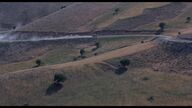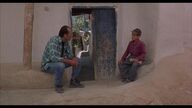The fifth Abbas, preceded by the famous trilogy and the more famous Taste of Cherry. The film begins with Abbas's favorite winding road. A car slowly zigzags on the road. The dialogue in the car is intermittent, and the camera lens is like a pair of simple and undisturbed eyes, staring forever. of Iranian villages.
In Abbas's behind-the-scenes conversation about Gone With the Wind, he mentioned why there is always very little straight road in his films, because straight road is an image in poetry, but in reality , For Orientals, meandering is the way we face life and solve problems, we tend to be a trickle rather than a flood, and used to be slow rather than fast, just as in the most familiar "curve to save the country", we will also Meandering is seen as an important way of life. On the other hand, the meandering is more mysterious than the straight one, especially in Abbas's shots, those villages have their own winding paths, and people travel between them before the birth of life, while the audience is Follow this meander and gradually fall into Abbas' narrative.
The plot of the whole movie is as its name suggests, and it's ambiguous even at the end, it seems to say something and it doesn't seem to say anything. Several engineers from Tehran suddenly visited a village, and although the villagers were talking about it, they also sincerely welcomed them. One of the engineers seemed to be curious about everything. He was always asking about a sick old woman in the village, and he was always driving to the top of the mountain to talk to his boss. At the top of the mountain, he met a man who was digging a well by himself. They would chat a few times, and the days passed peacefully like this. The old woman's condition improved. The engineers seemed to be in a hurry. They didn't want to wait any longer. Seeing this, we can only guess that they came here to Waiting for the death of the old woman, but why waiting for death still depends on their own imagination. Until one day, when the engineer went up the mountain, the ground collapsed and buried the digger alive. He mobilized the villagers and doctors to rescue him. At this time, the old woman was also critically ill. The next day the engineer was also ready to leave, but on the last day, the death they had been waiting for came, but the engineer just picked up the camera and hurriedly photographed the sad faces of the villagers and left, and the film ended here .
Abbas said he likes ambiguity because that's the reality. Ambiguity means the secret of life, and secrets should not be exposed nakedly. On the contrary, secrets should give people room for imagination. A story that wants to tell too many answers is equivalent to telling nothing at all. In the conversation, Abbas referred to what he calls "canned films", which are well-crafted but artificial, where there is nothing wrong with canned products, which are delicious and provide a momentary definite enjoyment and excitement, but Life is not like that. Life is always unpredictable and unpredictable. We don't know if the engineers are the reporters who came to expose the funeral, and we don't know if the buried well digger will survive after being rescued. , but the wind is still blowing on the winding road of the village, the people in the fields are still working, they will not stop until the cup of tea when they come home after work, there are many questions that have not yet been answered, but what is the answer? ?
We can't answer the passing of life, and we can't know the continuation of life. When tomorrow comes, the living will continue to work hard for their lives, and the dead will only pass with the wind like yesterday.
View more about The Wind Will Carry Us reviews







